- Home
- Mick Foley
The Hardcore Diaries Page 2
The Hardcore Diaries Read online
Page 2
“And if you don’t like this idea, you can probably blame Michael Hayes, for doing a pretty good job of convincing me to stick around after ’Mania.
“Look,” I continued. “Last year you did a really good job of building up the ECW Pay-Per-View around the aura of the name and reputation of ECW.” Everyone nodded in agreement. “I don’t think we can get by on just aura and reputation this year. I think we need to create compelling rivalries that the fans will feel strongly enough about to spend money on.” More nods. “I think I’ve got an idea that will create a compelling rivalry,” I said. “But it’s an idea that really hinges on three important things.”
I’m well into the windup, about to release the pitch.
“Number one, we need to firmly believe that Terry Funk can get over as a main-event attraction in a very short time.” I turn to Dusty, who knows Terry as well as anyone in the business. “I think the Dream [Dusty’s nickname is “The American Dream”] can vouch for me when I say that even at age sixty, Terry does a real convincing job of making fans think he’s out of his mind.”
“That’s because he is out of his mind,” the Dream says with a laugh, eliciting further laughs from around the table. Vince isn’t laughing, but he is smiling, which is a good sign. His relationship with Terry has been a contentious one over the years, dating back to 1993, when Terry walked out on a major Pay-Per-View, leaving only a note that read, “My horse is sick. I think she’s going to die. I think I better go.”
“Number two, we need to firmly believe that Edge and I can form one of the most unique short-term tag teams in recent history.” There is a general feeling that item number two had distinct possibilities.
“And number three, for this angle to work, Vince, you really need to get physically involved.”
Uh-oh, I said something wrong. I sense a general uneasiness around the table. Vince breaks the tension, saying, “Actually, I was going to get physically involved with DX.”
DX is D-Generation X, Shawn Michaels and Triple H. They were a harbinger to the attitude era of the late 1990s—a boom period for WWE—and their imminent reformation had been one of WWE’s best-told stories. I can see Vince’s point, but firmly believe that he is a character large enough to place his footprints in the foundation of two simultaneous angles. Especially if I can convince him that our idea can feed into the DX angle—that an incensed Vince McMahon can be more dangerous than ever. Besides, I’ve got a secret weapon.
“Vince, I want to become the first ever voluntary member of the Vince McMahon ‘Kiss My Ass Club.’”
My favorite billionaire, Vincent K. McMahon.
For those of you who don’t know, or simply need a brief refresher course, the “Kiss My Ass Club” is Vince McMahon’s long-running, incredibly degrading, incredibly entertaining spectacle in which a WWE Superstar or employee will be made, usually through force, to actually plant a smacker on the boss’s billionaire buttocks. And no, when I say “boss,” I’m not talking about Steinbrenner or Springsteen, I’m talking about Vince.
The secret weapon seemed to work. Vince’s attention was all mine.
I quickly laid out a four-week plan that would see the formation of the Edge/Foley team, leading to our two-week mockery/bludgeoning of ECW “legends” who were not exactly legends, leading to a Foley/Vince verbal confrontation. You see, once Vince caught on to the idea that Edge and I were deliberately trying to sink the ECW Pay-Per-View, he would become irate. Such a deliberate sinking, after all, would cost Vince a fortune—he’d be down to seven or eight hundred million in no time.
“A week after that confrontation with you, Vince,” I said, “probably at the Raw in Las Vegas [May 22], I would summon you into the ring, with the promise of an apology.
“So you’d say, ‘I guess you want to apologize for calling me a no-good son of a bitch last week, huh, Mick?’
“But I’d say, ‘No, actually, I meant that one.’
“Then you’d say, ‘So, I guess you’re going to apologize for saying I was a heartless bastard.’
“But I’d say, ‘No, actually I meant that, too.’”
I can see that Vince is intrigued. He likes walking this fine line between fact and fiction. For him, it’s every bit as comforting as a brisk autumn leaf-peeping, bird-watching stroll would be to nature lovers.
“So, Vince, you’d be kind of losing your patience with me, as I try to explain myself. I’d say, ‘No, Vince, I want to apologize for what I said about you in my book. Do you remember when I wrote that no man I’d ever met had your drive and intellect?’
“Vince, you’d kind of nod, okay, then I’d say, ‘Well, I didn’t really mean that.’
“Then I’d say, ‘You know how I told you on the phone once that I considered you to be on the level of U.S. presidents? Well, I didn’t really mean that either.’
“Vince, at this point you’d kind of snap, you’d say, ‘Dammit, what’s your point?’
“And I’d say, ‘Vince, don’t you get it? I was saying things I didn’t really mean just because you were my boss, just because you signed the checks.’
“‘So?’ you’d say. ‘What’s wrong with that?’
“I’d say, ‘Vince, don’t you get it, I was kissing your ass.’
“‘Yeah,’ you’d say, ‘but everyone does that, that’s part of doing business.’
“‘But,’ I’d say, ‘it’s not part of being Mick Foley. Being Mick Foley means saying what I mean, and meaning what I say. It’s about being a man I can be proud of. And what kind of a man would I be, Vince, if I’m willing to kiss your ass figuratively, but not literally?’
“Vince, you’d get this big smile on your face, because you’d kind of see where I was going with this. You’d say, ‘You mean?’
“And I’d say, ‘I want to join the club.’
“‘The club?’
“‘The club. Vince, I want to join the Vince McMahon ‘Kiss My Ass Club,’ right here in Las Vegas, Nevada.’”
The creative team seemed to love it. As I thought, it was an idea that was pretty much selling itself, but it didn’t hurt that I was pitching the thing pretty damn well. I continued to pitch, describing how the inaugural voluntary membership ceremony could be pushed back to the final segment. In the interim, Vince could be making phone calls, procuring a live symphony, hiring showgirls. After all, it would be Vegas.
Then on to the glorious ceremony, where after being regaled with live music and a Vegas production number, I would attempt to plant that kiss…but would see my valiant attempt interrupted by that no-good Terry Funk, who would attempt to take me out of this fateful decision by appealing to my pride, my manhood, my legacy—whatever it might take to get my lips out of the general proximity of Vince’s ass.
Then, just as Terry is really reaching me, just as he’s about to talk me out of this tasteless moment of oral anguish—BAM!—there’s Edge, laying out the Funker, snapping me back into reality, making me realize the treacherous act that Funk was about to perpetuate. Then we’d lay the boots into Terry, much to Vince’s delight.
“Then, Vince, you’d get on the mike, you’d say, “Dammit, someone’s going to kiss my ass tonight. Get Funk over here.’
“And Vince, you’d get this huge smile of satisfaction on your face as human lips meet human ass.”
Vince looks like he’s in heaven. This is going even better than I expected.
“But in a split second, that smile would turn into a look of abject horror as you realize that…Terry Funk is tearing a chunk out of your ass!”
The table erupts. A couple of the writers nearly fall out of their chairs. My summation is just a formality as everyone agrees that this idea is foolproof.
Vince can come back madder then ever. He can take out his frustration on DX. He can join forces with me and Edge in our attempt to derail the ECW Pay-Per-View. Sure, it might hurt his pocketbook, but something far more valuable has already been hurt—his ass. His pride, too. His ass and his pride. And his pride in his ass.
That’s been hurt as well.
From there it’s a short step to Funk and Tommy Dreamer facing me and Edge at ECW’s One Night Stand.
Brian Gewirtz has one small concern. “Las Vegas is the night that DX is supposed to get to Vince.”
My heart momentarily sinks. But thankfully, Gewirtz isn’t done.
“I think if we moved it up a week to the fifteenth, it would be even better. We’re in Lubbock, Texas, right outside of Terry’s hometown.”
A rush of enthusiasm goes around the table. I think everyone sees the potential of Terry Funk taking a bite out of Vince McMahon’s ass in his West Texas stronghold, where the Funk name is almost synonymous with wrestling.
I say good-bye to the creative team. Stephanie publicly thanks me for dressing up for the meeting, then asks me privately if her comment hurt my feelings. Of course not. My wardrobe, or lack thereof, is a personal choice I made a long time ago. It’s more than fair game for innocent teasing.
Vince wraps me up in a big hug. It seems that we’ve got ourselves a deal. A deal I can’t wait to commence. He likes me! He really likes me! And the truth is, I really like him. Again. But it hasn’t always been that way.
Falling into a Falling-out
It was May 7, 2001, the day the New York Times article came out. It should have been a great day. My publicist at Regan Books, Jennifer Suitor, had told me what a big deal making the Times was, but I really hadn’t a clue to what extent the world revolved around a single newspaper.
People magazine called that same day, after previously declining the idea of a story. The Today show called too, even booking me for the very next day in a minor life-changing interview with Katie Couric. Today had also been previously uninterested. Judith Regan called, too. Judith was my publisher, a very important person in her industry—hence the name Regan Books—and had been very supportive of my writing. It seems that the Times article had mentioned my interest in writing a novel. Not that I was actually writing one—just that I had an interest.
That interest was apparently enough for Judith, who offered me a two-book contract, with or without the participation of WWE. Hey, I thought, even Mick Jagger makes a solo album every now and then before returning to the Stones. Since retiring from wrestling (or so I thought) in February of 2000, I had been looking for something I could do on my own. It wasn’t that I didn’t love WWE, or appreciate everything we had achieved together. But I just felt like I needed to do something outside my safe little environment. I was like Herbie the dentist—I wanted to be independent. But just like Herbie had Rudolf, I had Judith Regan. We were going to be independent…together.
Out of courtesy, I called up Stu Snyder, then WWE president, to let him know I was planning on accepting Judith’s very kind offer. In my opinion, WWE could have been a little more understanding.
As I mentioned, it was May 7, 2001. It should have been a great day. But instead, May 7, 2001, became a day of great division concerning my relationship with WWE. Everything before May 7, 2001, was pretty good. Everything after it? Not so good.
Maybe it was the damn XFL’s fault. Or maybe it was the fault of little Mick, about four months old at the time. Yeah, I’ll blame it on him. Or maybe it was a combination of the two. You see, prior to the formation of the XFL and the birth of Mickey, I had enjoyed a fairly close working relationship with Vince. I was in the loop. I had been fired (a classic on-air Vince McMahon version) in December 2000, simply as a way to give me some time at home for the impending birth of my child. The on-air firing was the one concept the Times writer couldn’t quite grasp. I guess in the real world (until Donald Trump blatantly stole Vince’s gimmick) such things didn’t take place.
But I always assumed I’d be back. After all, I’d moved back to Long Island, in part to be closer to the WWE site-based entertainment complex (restaurant) in New York City, which was vital to my on-air role as WWE commissioner.
Had I known that my days as commish were really over, with the exception of a short-lived return later in 2001, I’m not sure I would have moved. It’s expensive on Long Island. Cold, too. But at least the cold eventually subsides.
Had I stayed in the loop with Vince, things probably would have been much different. I had been fired with the general understanding that I would come back to battle Vince at WrestleMania, probably with my commissioner’s job hanging in the balance. Simple premise, right? Had I been in touch, I simply could have heard their idea, told them it didn’t make sense, proposed a better one, had that shot down, reached a compromise, and come back to vanquish Vince at Mania.
Instead, I heard the idea about a day before its scheduled shooting, got cold feet, and called up Vince, saying something about “never wrestling again,” blaming it on fear of one final devastating head injury.
WrestleManiawas salvaged. In fact, it may have been the greatest WrestleMania of them all. I even refereed Vince’s match with Shane, and aside from considering the possibility that Vince nailing me in the back of the head with a chair (it was supposed to be the upper back) was not entirely unintentional, I thought all was again well in our relationship.
But in retrospect, I will always look at my decision to bow out of WrestleMania (a decision that probably cost me a few bucks, too) as the reason I would come to feel like “the boy who cried wolf” in Vince’s eyes.
I had been a wrestler, I had been the commissioner, and I just felt like I was drying up, dying on the vine. There were other things I wanted to try in life, without a WWE contract hanging over my head.
It was in July of 2001 that I asked for a meeting with Vince. I showed up in Stamford with a list of grievances, but the moment I sat down, I just went for broke and asked for my release from the company. What ensued was fairly ugly, a shouting match that echoed through the halls of Titan Towers and shook the very foundation of our business and personal relationship.
No, I didn’t get the release, at least not at that time. But I did get something else—confidence. Vince McMahon was a superhero (or supervillain) of sorts, a larger-than-life billionaire I had been watching on television since childhood. Yelling at Vince had been very therapeutic. I had stood my ground, made my points, knocked away many of his contentions, and, in the process, gained a new belief in myself.
I mean, after this, life was easy. What was there to fear? I felt like I could do anything. Debate foreign policy with the president? Easy. Stand up for causes I believed in? No problem. Get in the gym and shed some of those pounds I’d piled on? Well, let’s not be ridiculous.
I specifically remember the outcome of one of those verbal volleys with Vince. He was contending that the WWE machine had made me who I was, and that it therefore wouldn’t be fair for me to just walk away from it.
I said, “Vince, if that is true, how come my most popular character was actually Commissioner Foley, which was just me dressed in my regular clothes, acting like myself?”
“That’s not true,” Vince said. Although he damn sure knew it was. For although my commissioner character didn’t sell merchandise (I didn’t even have a shirt) or drive Pay-Per-Views, in terms of recognition and response, none of the other characters I’d played came close.
“It is true, Vince,” I said.
“No, that would be…Dude Love.” I’d done it! Point Foley. By opting for such a ludicrous joke, Vince had conceded that particular round of the great July shouting match.
I finally did get that release in November, with the help of my friend Katie Couric. Apparently, I’d made a decent impression on Katie during our first interview in May, as I was invited back for Halloween, in conjunction with my children’s book Halloween Hijinx. I’d actually received the invite mere days after that first Katie interview, prompting me to ask a mature question of my publicist: “Does that mean Katie likes me?” Yes, it was asked in the same tone as a sixth-grader in the throes of his very first crush.
“Well,” she said, “it means somebody likes you, because they just booked you five months in advance.”
Thinking about that interview was actually a great source of comforting anticipation to me. It was like the anticipation of a Disney trip or the promise of Christmas morning: it was going to be just me and Katie, and my wife, and kids, and Matt, and Al Roker, and Anne, and…well, you know what I mean.
Suffice it to say, it was going to be a big deal, and I didn’t want WWE screwing it up.
In my opinion, WWE made the whole Halloween book experience a lot harder than it should have been. It was their book, and I understood that WWE did business in a way that was not conventional. Which was fine with me. But not paying my artist, who was a friend, was not fine. Sure I knew that she’d eventually get paid, but that knowledge was of little comfort to my friend, who hadn’t received a dime for work that had been completed several months earlier.
Jennifer Suitor had worked with me on three previous books. We’d spent literally hundreds of hours together, and during that time, I don’t think she’d heard me raise my voice, let alone yell. But, oh, that came to an end the day before Today , when I let loose during a phone call from WWE.
Courtesy of the Foley family.
“This is not a WWE event,” I yelled. “This is my event. They didn’t ask for me because I was a WWE guy. They asked for me because they liked me. WWE has taken a book that should have been nothing but fun, and they’ve taken all the fun out of it! You haven’t even paid my artist! The Today show invited my family, and it’s going to be a special day for me. And I don’t want WWE there for it!”
Jennifer was impressed. She knew I’d been feeling the strain of this failing relationship I had with WWE, and she knew how much this Today show appearance meant to me. Hell, I even wrote a bonus chapter, “Reflections on Katie” for the paperback version of Foley Is Good.
So, it was with some trepidation that Jennifer later told me that WWE had asked for four passes to the show. It was at that point in the proceedings that I called a producer at Today and effectively had WWE banned from the building.

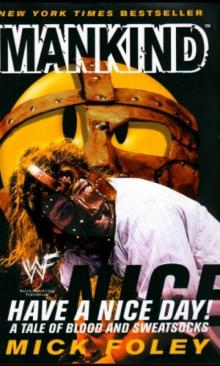 Intro
Intro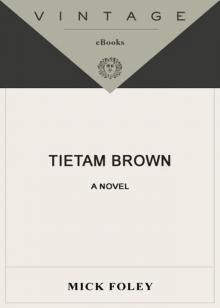 Tietam Brown
Tietam Brown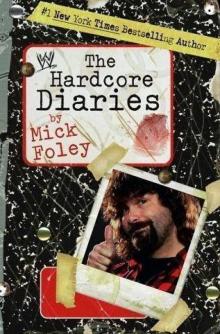 The Hardcore Diaries
The Hardcore Diaries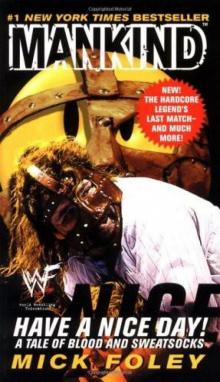 Have a Nice Day!: A Tale of Blood and Sweatsocks
Have a Nice Day!: A Tale of Blood and Sweatsocks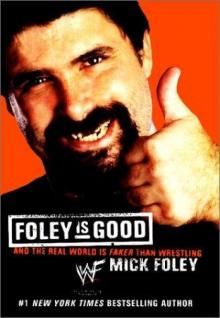 Foley Is Good: And the Real World Is Faker Than Wrestling
Foley Is Good: And the Real World Is Faker Than Wrestling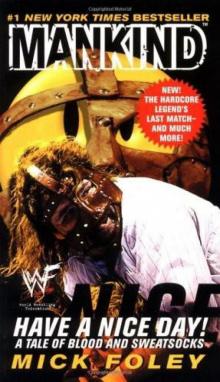 Have a Nice Day
Have a Nice Day